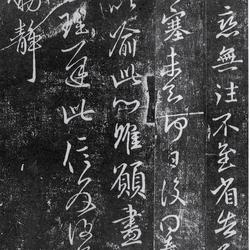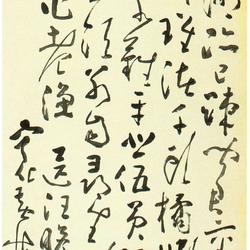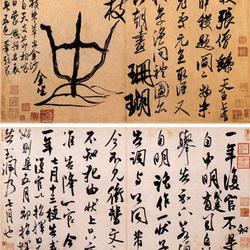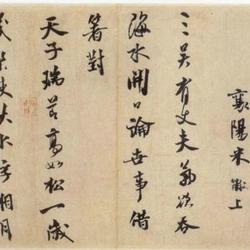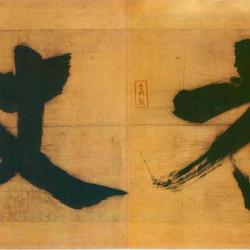"Poetry on the Water of Wild Tiger", calligraphy by Lu Juren, paper, hand scroll, length 28.2cm, width 130.7cm, cursive script, 41 lines. Collection of the Palace Museum, Beijing.
On the front of the volume, there are two seals of the Lu family "Yun Jian" and "Yougu Yisou"; at the end of the volume there are the seals of the Lu family "Zhaishan", "Lu family Juren", "Jingshou Mountain", "Wosong Pavilion" and "Zhiji". "Xuan" is printed in 5 directions. Xiang Yuanbian, Bian Yongyu, and Anqi have the most seals in the collection, and they are numbered by Xiang's "Yi Zi Hao". A seven-character ancient poem in the volume "Poetry on the Water of Tiaozi" praises the craftsman Lu Wenjun for making excellent and durable brushes and taking the merit of creation. According to the self-signed year, this volume was written in the fourth year of Xinhai (1371), the fourth year of Hongwu in the Ming Dynasty. It is a masterpiece of Lu Juren's cursive calligraphy in his later years. The calligraphy is elegant and graceful, and is inspired by the legacy of Zhang Xu, Huai Su and Sun Guoting. In the latter part, there are Zhang Shu's regular script and Lu poems written in the Yuan Dynasty, which are Zhang Shu's famous works passed down to the world. There is also a postscript written by Chen Pu and a poem written by Yuan Kai in the Yuan Dynasty. This volume was collected by the Imperial Palace of Qianlong and Xuantong in the Qing Dynasty.
Explanation of the volume of "Poems of Tiao River": The water of Tiao River comes to Tianmu, and the moonlight soaks Qiongyao Terrace. Shi Longyun and his grandson lived in a stream cave, where birds and jade rabbits appeared and the moon appeared. The jade rabbit's autumn hair is as strong as iron, and Kunlun's bamboo and Kun's knife can cut it. The bundles of hair, tubes, and bamboos are neat and pointed, and there are not many hairy cones that stand out. When I came to offer the cloud window, I held on to it, and it was full of wind and rain. The waves are turbulent and the sea is standing, driving the hair into the waves and drinking Xuanmei. The dragon and snake in Shanze once dared to sting, and flew away in clouds, smoke, ghosts and gods weeping. For a long time, Ke Dou has abandoned the seal structure, and there is no way to turn the orange plaque into Panyu. The leaping dragon and crouching tiger are comfortable, and the bell king grass and the sage are competing for fun. In his later years, he wrote books, and every time he drew, he loved the bones in his heart. A good forest is not as strong as iron, and all the talents are like black pigs. Suiliang didn't know the people who chose the materials, and it was difficult to express the charm and power. Ruli is like Guan Tuer's ornament, and Hu Neng can throw it away. The skill of Tiaodong is better than that of house attack, and several people are so handsome that they are called good workers. To mend the sky, we must seize the power of creation. When can we enter the Mingguang Palace? The unicorn is trickling down and the cold water is flowing, and the eyes are vaguely wandering. There are three hundred pictures of vines and cocoons, and a flick of spring ointment purifies the jade. The words are grand and powerful, and thousands of dendrobiums are produced in an instant. The vast literary thoughts flow east of the river, and the shame of servants is as small as a fly. He knows how to tie a tiger's beard to make a rafter brush, and paint a picture of the salty, clear and peaceful world. It is said that the rock is more shady and looking for travel, and the Qishan drum is inscribed with Yan Ran's inscription. The sound of chanting on the cliffs of Wuxi River revitalized the Yin, Zhou, Han and Tang Dynasties. At this time, Ming Sui's achievements were completed, and Gong'er Zhongshu granted him the title of Guanzhou City. On the 12th day after the winter solstice in Chongguang Dayuan, old man Yun Song sent letters to the east of the city.

